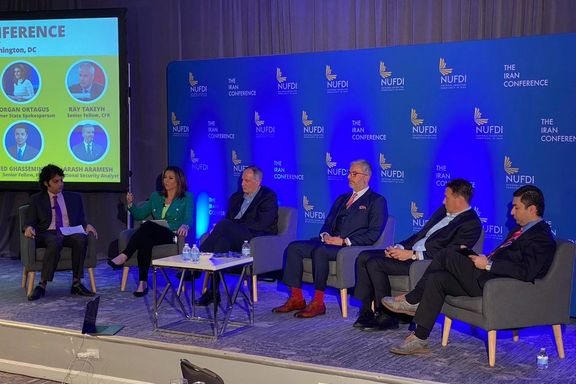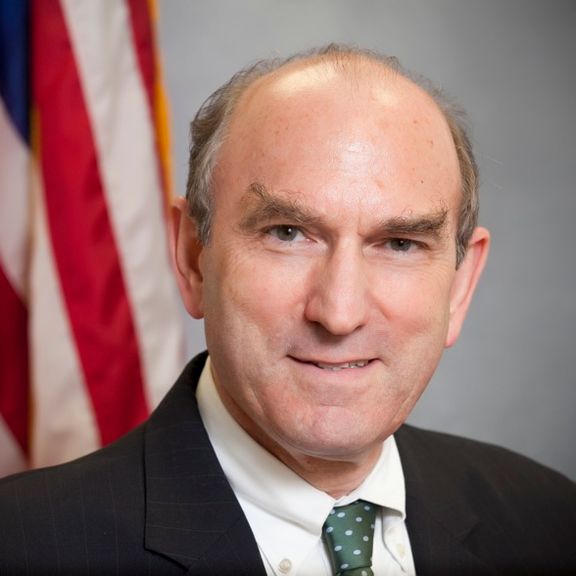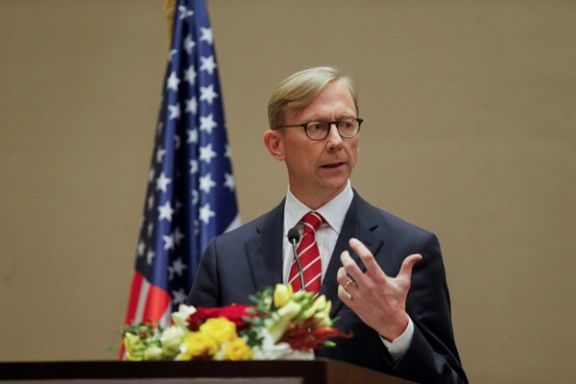Conference In Washington Highlights Threats Posed By Tehran

Activists, experts and former officials gathered for a conference to discuss human rights in Iran and issues related to Tehran's military and regional threats.

Activists, experts and former officials gathered for a conference to discuss human rights in Iran and issues related to Tehran's military and regional threats.
The February 10 event was organized by the National Union for Democracy in Iran (NUFDI), a nonprofit organization of Iranian Americans who want to raise awareness about the country. The conference was attended by leading experts and activists who have close involvement with issues related to Iran or a keen interest.
During the event, former United States Special Envoy for Iran Elliott Abrams spoke about the difference between Iran and the Islamic Republic, saying that Washington often only focuses on one issue such as the hostages or Tehran’s nuclear program and forgets that there is a country with tens of millions of people there who are being repressed by the regime.
“The problem is not Iran… it’s the Islamic Republic”, he underlined, saying that “the people of Iran never voted to support Houthi attacks on the Emirates and Saudi Arabia. The people of Iran never voted in a referendum if they should have a policy of death to America, death to Israel”.

He added that there is “too little attention about the human rights situation in the country”.
Abrams argued that there is no unified theory on how to deal with Iran, for example Israel is worried about the Islamic Republic building a nuclear bomb but Saudi Arabia is concerned about Iran’s support for Houthis or the proxy militias in Iraq.
“If you say regime change, people think you mean war” but this is not how the US seeks regime change in Iran. “We stand with the people of Iran in their desire for hopefully peaceful change toward a democratic regime”.
By regime change, “we mean allowing the people of Iran to determine their own future”, Abrams stated.

Brian Hook, also a former US special representative for Iran, described the Islamic Republic as the “world’s leading state sponsor of terrorism” noting that Iran’s claims about peaceful nuclear power are not true because they continue enriching uranium.
He defended Donald Trump’s decision to leave the nuclear deal, saying that when such a country is talking about peaceful nuclear power and continues enriching uranium, “if you accept it, it would be hypercritical to tell others that they cannot enrich”.
“We should not be resigned to Iran as a nuclear threshold state; it will change the balance of power in the Middle East profoundly”, Hook said, adding that “if talking and dialogue worked, we would have solved it a long time ago. We have to put in place a campaign of pressure, diplomatic, economic, all of it”.
He said the Iranian regime should understand that enrichment is a non-negotiable issue, saying all the talks with Iran should be focused on this.
Iran ramped up its enrichment after the Trump administration fully sanctioned its oil exports in May 2019 and took it to a higher level when President Joe Biden signaled he was ready to negotiate and restore the JCPOA.
Hook said that he is worried if the Vienna talks reach a conclusion that sees sanctions lifted and Iran back to the Swift global banking system and opening the economy, “that money doesn’t go to the Iranian people; it goes to Hezbollah, Hamas, PIJ (Palestinian Islamic Jihad) and Yemen”.
The former diplomat said the Iranian regime “is the last revolutionary regime on earth” with a global ambition and expressed hope that “over time the Iranian people would have a truly representative government”.
Morgan Ortagus, the spokesperson for the US Department of State from 2019 to 2021 said that Secretary of State Antony Blinken had promised a longer and stronger deal with Iran, but it seems that what the US is getting now is “even worse than the original deal in 2015”.
Ortagus described the deal as a “political football” adding that “If and when Republicans get back to power… they get out of the deal again”.
She criticized “the failed mindset of a deal or a war” saying that the JCPOA is “a very flawed deal” and it is getting even worse if you take the terrorism sanctions off, when Iran has done nothing to deserve having those sanctions lifted.